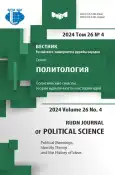Socio-Political Divisions in Russian Society: The Perspective of Young People
- 作者: Shlykova D.N.1
-
隶属关系:
- RUDN University
- 期: 卷 26, 编号 4 (2024): Political Meanings, Identity Theory and the History of Ideas
- 页面: 840-852
- 栏目: IDENTITY AND SOCIO-POLITICAL DIVISIONS
- URL: https://journal-vniispk.ru/2313-1438/article/view/322411
- DOI: https://doi.org/10.22363/2313-1438-2024-26-4-840-852
- EDN: https://elibrary.ru/KLIBVQ
- ID: 322411
如何引用文章
全文:
详细
Modern Russian society is characterized by a complex and dynamic socio-political structure, reflected in the diversity of views and value orientations. Of particular importance in understanding these processes is the study of youth - the generation shaping the future of the country and actively participating in public life. This article is devoted to the analysis of sociopolitical divisions in Russian society, focused on the perception of these processes by young people. The study is based on the theory of socio-political divisions (cleavage theory) and identifies three key divisions in Russian society that may intensify over time: “the super-rich / the rest”, “megapolis / city / village” and “Moscow / not Moscow”. These divisions were confirmed by focus groups and a mass survey among students, which showed their severity compared to other potential lines of confl ct. The process of self-identification within these divisions continues, and the potential for political mobilization is assessed as high.
作者简介
Daria Shlykova
RUDN University
编辑信件的主要联系方式.
Email: shlykova-dn@rudn.ru
ORCID iD: 0000-0001-8502-8261
Research Intern of the Department of Comparative Politics
Moscow, Russian Federation参考
- Bartolini, S. (2005). La formation des clivages. Revue International de Politique Comparée, 12(1), 9–34.
- Deegan-Krause, K. (2006). New dimensions of political cleavage. In R.J. Dalton, & H.-D. Klingemann, Oxford Handbook of Political Science (pp. 538–556). Oxford-New York: Oxford University Press. https://doi.org/10.1093/oxfordhb/9780199270125.003.0028
- Kozyreva, P.M., & Smirnov, A.I. (2021). Professional self-identification specifics and trends in Post-Soviet Russia. Sotsiologicheskiy Zhurnal = Sociological Journal, 27(1), 28–51. (In Russian). http://doi.org/10.19181/socjour.2021.27.1.7843.
- Lipset, S.M., & Rokkan, S. (1967). Cleavage structures, party systems and voter alignments: An introduction. In Lipset, S.M., & S. Rokkan. Party Systems and Voter Alignments: Cross-national Perspectives (pp. 1–64). New York: Free Press.
- Marks, G., Attewell, D., Rovny, J., & Hooghe, L. (2021). Cleavage theory. In M. Riddervold, J. Trondal & A. Newsom (Eds.), The Palgrave handbook of EU crises (pp. 173–193). Palgrave Macmillan.
- Römmele, А. (1999). Cleavage structure and party systems in East and Central Europe. In Cleavages, parties, and voters: Studies from Bulgaria, the Czech Republic, Hungary, Poland, and Romania (pp. 3–17). Westport, CT.
- Seiler, D.-L. (2009). Clivages et familles politiques en Europe. Bruxelles: l’Université de Bruxelles.
- Shlykova, D.N. (2023). Problem of Socio-Political Cleavages in Modern Russia. RUDN Journal of Political Science, 25(4), 974–985. (In Russian). http://doi.org/10.22363/2313-1438-2023-25-4-974-985.
- Semenenko, I.S., Lapkin, V.V., & Pantin, V.I. (2021). Social cleavages and political divides in a theoretical perspective: Criteria for assessment and classification. Polis. Political Studies, 5, 56–77. (In Russian). https://doi.org/10.17976/jpps/2021.05.05
- Meleshkina, E.Yu. (2004). The concept of socio-political divisions: The problem of universality. Political Science (RU), (4), 11–29. (In Russian).
- Semenenko, I.S. (2023). Divided societies. In I.S. Semenenko (Ed.), Identity: The Individual, Society, and Politics. New Outlines of the Research Field (pp. 27–35). Moscow: Ves’ Mir. (In Russian).
- Ilyin, M.V., & Ostapenko, G.I. (2024). Cleavages and identities in the changing landscape of world politics. Polis. Political Studies, 5, 46–65. (In Russian). https://doi.org/10.17976/jpps/2024.05.04
- Pantin, V.I. (2021). Civilizational features of the development of Russia in the context of modern social transformations. Bulletin of Institute of Sociology, 12(4), 108-124. https://doi.org/10.19181/vis.2021.12.4.754
补充文件









